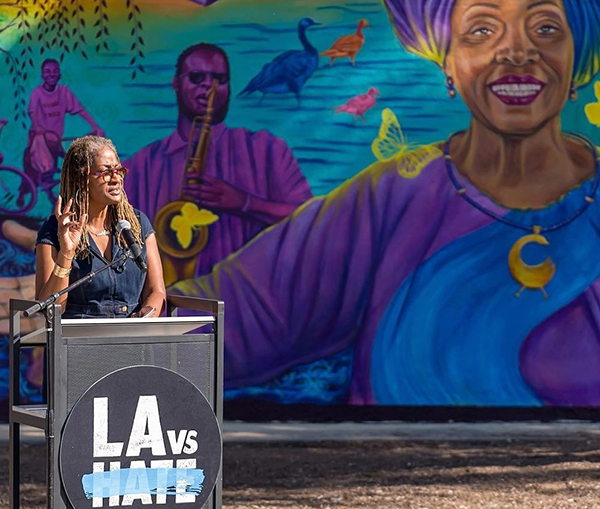By Earl Ofari Hutchinson
Contributing Columnist
Los Angeles County has once more attained a distinction that no county in America would wish upon itself. It is at or close to the top spot in the nation in hate crimes.
The latest annual report from the county Human Relations Commission found that hate crimes in the county hit a 21-year high in 2022. That far outpaced the number of reported hate crimes in just about any other county in the nation.
Now the obvious question is why in Los Angeles County, which by all measures is considered one of the most liberal, multi-ethnic and diverse counties in the nation, there is so much hate, at least as measured by the number of hate crimes? The commission gave no answer to that question. But it gave a hint in the make-up of the reported victims.
To no surprise, Blacks and Jews are still the prime victims. This pretty much follows the victim pattern that has been consistent for decades.
LGBT persons also made up a significant number of victims of hate attacks. The issue again is as usual race, religion and gender. Blacks, Jews and LGBT persons are both soft and visible targets for hate and violence.
The commission again called for stepped up measures to improve race and religious tolerance and relations. Yet it recognizes that no matter how much awareness about the need for greater tolerance is emphasized, racial and religious animus will remain deeply rooted in the thinking, attitudes and tragically action of far too many in the county.
There are two daunting problems in mounting an all-out frontal attack on hate crimes.
One is reporting. It is tough to fathom, let alone, prove that the alleged assailant committed a hate attack solely because of the race, gender or sexual orientation of the victim.
Some states have loosened their hate crime laws to make bias motivation only one factor in determining what is a hate crime.
The other major problem is the prosecution of attacks that apparently are motivated by racial, gender or religious bias as hate crimes. The great danger in not quickly slapping hate crime charges in those cases is that it minimizes and marginalizes hate violence. Hate crimes, and especially hate crime violence, remain grossly under-reported and prosecuted.
The federal Department of Justice’s Bureau of Justice Statistics tracked hate crime reporting and violence from 2003 to 2011. Its findings were appalling.
It found that a huge portion of hate crimes are never reported to law enforcement. It found that a considerable number of hate crimes that are both reported and un-reported have resulted in serious injury or death to the victims.
In fact, the study found that victims of hate violence are more likely to be injured than victims of ordinary crimes of violence. There is little evidence that this has changed in 2022.
The even greater problem is that often when hate crimes are reported as such the perpetrators often evade full punishment. That has nothing to do with the First Amendment, but muddled, confused and outright lax enforcement and prosecution of hate acts.
Even when the FBI and local law enforcement agencies identify individuals for their propensity for violence their hands are still tied.
State prosecutors flatly say that hate perpetrators are more likely to be convicted and get stiff sentences if their crime is treated as just a garden variety criminal case. That makes good legal and political sense — if they’re prosecuted locally and if there’s a hate crime enhancement, which is far from assured.
Yet, that’s not the only reason for their hands off on many hate criminals. Except in the highest profile cases, they see those prosecutions as no-win cases with little political gain, and the risk of making enemies of local police and town officials.
Hate crimes may be horrific but they are seen as common crimes and are treated as such. Few state prosecutors will chance inflaming racial, gender or sexual orientation passions and hatreds by slapping a hate crime tag on a case except in the most heinous and high-profile cases.
There’s also the belief that hate crimes are mostly a thing of the past. When they do occur, they are isolated acts committed by a handful of quacks and unhinged young persons and that state authorities vigorously report and prosecute the perpetrators of these crimes. That is a myth.
When Congress passed the Hate Crimes Statistics Act of 1990, it compelled the FBI to collect figures on hate violence. But it did not compel police agencies to report them. Record keeping on hate crimes is still left up to the discretion of local police chiefs and city officials.
Many police departments still refuse to report hate crimes, or to label crimes in which gays, Jews and minorities are targeted because of race, religion or sexual orientation as hate crimes. Still other police departments don’t bother compiling them because they regard hate crimes as a politically loaded minefield that can tarnish their image and create even more political friction.
The official indifference by many police agencies to hate crimes prevents federal officials, even if they wanted to enforce civil rights laws more aggressively, from accurately gauging the magnitude of civil rights violence.
The county commission’s latest hate crimes report is both a warning and a call for greater action by local officials against hate violence. Anything less sends the wrong message.
Earl Ofari Hutchinson is an author and political analyst. His forthcoming book is called “Is Biden Really Too Old? — The Age and Ageism Obsession in American Politics” (Middle Passage Press). He also is the host of the weekly Hutchinson Report on KPFK 90.7 FM Los Angeles and the Pacifica Network.












